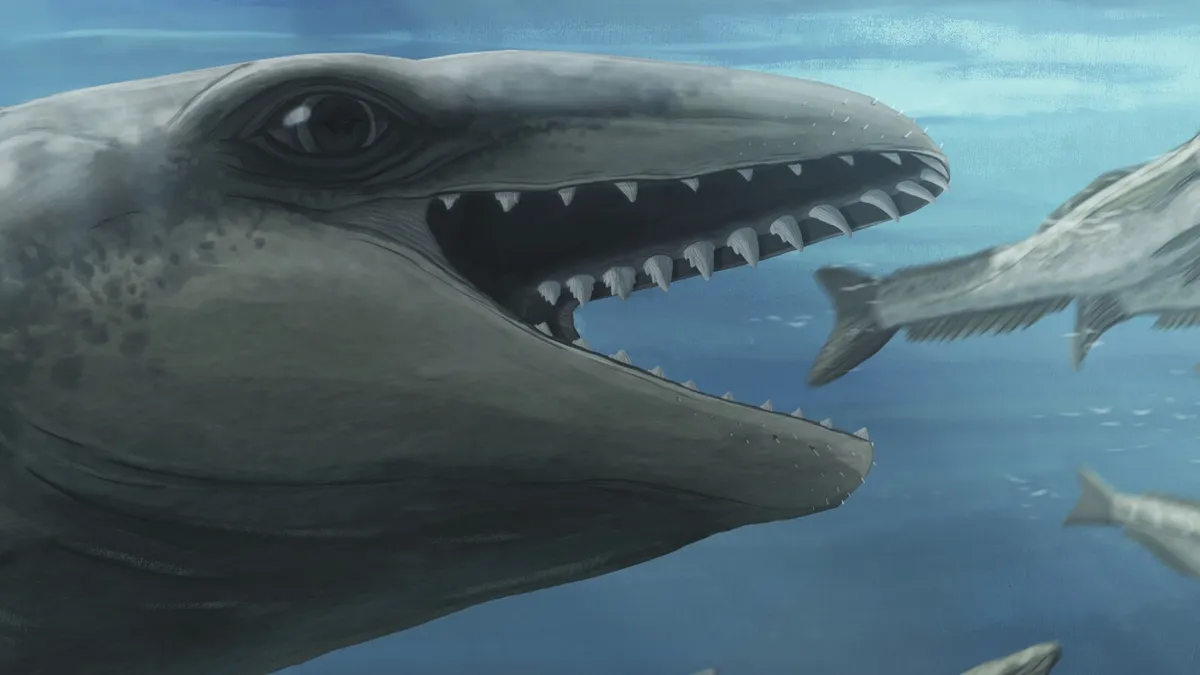
Wellington, New Zealand — In a groundbreaking discovery, paleontologists have identified a rare, entirely new species of prehistoric whale, named Janjucetus dullardi, thanks to a 25 million-year-old fossil found on an Australian beach. This remarkable find sheds light on the evolution of whales, revealing insights into their ancient ancestors that were anything but gentle giants.
The newly identified species, Janjucetus dullardi, boasts a quirky appearance reminiscent of both a whale and a cartoon character, featuring bulging eyes the size of tennis balls. Unlike contemporary whales, this juvenile specimen was notably small, fitting comfortably in a single bed. With sharp teeth and a snout resembling that of a shark, this creature was clearly a formidable predator, embodying a fierce and aggressive nature.
“It was, let’s say, deceptively cute,” remarked Erich Fitzgerald, the senior curator of vertebrate paleontology at Museums Victoria Research Institute and one of the authors of the study published in the Zoological Journal of the Linnean Society. “It might have looked for all the world like some weird kind of mash-up between a whale, a seal and a Pokémon, but they were very much their own thing.”
The partial skull of Janjucetus dullardi, which includes ear bones and teeth, was discovered in 2019 along the fossil-rich coastline of Victoria, Australia. Jan Juc Beach, known for its rich paleontological significance, has become a hotspot for understanding early whale evolution. Fitzgerald emphasized the uniqueness of this discovery, noting that Janjucetus dullardi is only the fourth species ever identified from a group known as mammalodontids, which thrived during the Oligocene Epoch, approximately 34 to 23 million years ago.
This tiny predator, believed to have grown to about 3 meters (10 feet) long, represents an intriguing branch of the evolutionary tree leading to today’s great baleen whales, such as humpbacks, blues, and minkes. Fitzgerald explained that these toothy ancestors likely had small stumps for legs, adding to the enigma of their appearance and lifestyle.
The species Janjucetus dullardi is named in honor of Ross Dullard, an amateur fossil hunter whose life-long passion for paleontology led him to this extraordinary find. “It’s literally been the greatest 24 hours of my life,” Dullard expressed joyfully after the official naming of the species. His discovery came during a routine fossil hunting trip at Jan Juc Beach, where he noticed something unusual protruding from a cliff. A closer inspection revealed a tooth, confirming to him that he had unearthed something special.
Dullard promptly shared photographs of the find with Museums Victoria, where Fitzgerald recognized the significance and potential of the specimen. Confirming the uniqueness of Janjucetus dullardi was crucial, as this was the first mammalodontid identified in Australia since 2006 and only the third overall in the country. Fitzgerald noted the rarity of such discoveries, as the fossil record of cetaceans is extremely limited due to the many factors that affect fossil preservation.
Discoveries like Janjucetus dullardi are not only fascinating from a paleontological perspective but also offer vital insights into the evolution and adaptation of ancient whale species. Researchers believe that studying these prehistoric cetaceans can illuminate how modern marine life may respond to the challenges posed by climate change.
Dullard plans to celebrate his monumental find with a fossil-themed party, complete with cetacean games and whale-shaped treats. “That’s taken my concentration for six years,” he shared. “I’ve had sleepless nights. I’ve dreamt about this whale.”